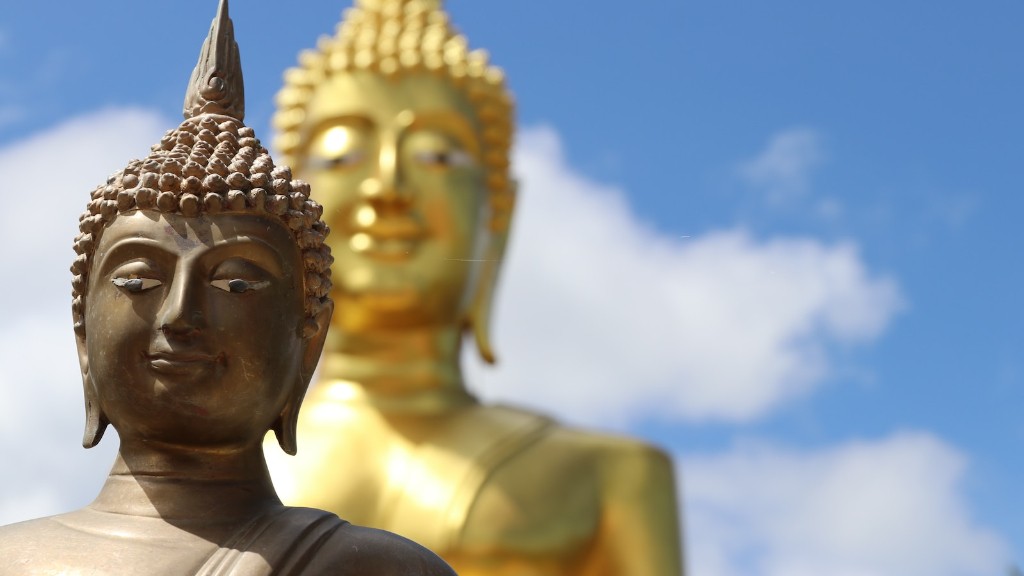Buddhism and Christianity are two of the world’s largest religions. They share some commonalities, such as a belief in ethics, morality, and doing good in the world. But there are also significant differences between the two faiths. Christianity is centered around the belief in one God who created the world and all that exists in it, while Buddhism teaches that there is no one god, but rather that all beings have the same Buddha nature and are interconnected. Christians believe in salvation through faith in Jesus Christ, while Buddhists seek enlightenment through following the Buddha’s teachings. Buddhism also places a strong emphasis on meditation and mindfulness, while Christianity largely focuses on prayer and worship. Ultimately, Buddhism and Christianity are two very different religions that offer different paths to salvation or enlightenment.
There are many differences between Buddhism and Christianity. For one, Buddhism is a nontheistic religion, while Christianity is a theistic religion. This means that Buddhists do not believe in a personal God, while Christians do. Additionally, Buddhists believe in karma and reincarnation, while Christians do not. Buddhists also seek to achieve nirvana, or spiritual enlightenment, while Christians seek to achieve salvation. Finally, Buddhists typically follow the teachings of the Buddha, while Christians follow the teachings of Jesus Christ.
Can a Buddhist believe in god?
Buddhists do not believe in any kind of deity or god, although there are supernatural figures who can help or hinder people on the path towards enlightenment. The most important thing for Buddhists is to follow the path of the Buddha and to live in a way that leads to peace and happiness.
The central iconic imagery of the two traditions underscore the difference in their belief structure. The peaceful death of Gautama Buddha at an old age is contrasted with the harsh image of the crucifixion of Jesus as a willing sacrifice for the atonement for the sins of humanity.
What beliefs do Christianity and Buddhism have in common
Religions, like Christianity and Buddhism, emphasize on behaving with decency and respect. This is what we call morality. And this is the proof of any spiritual practice.
Buddhism is a tradition focused on spiritual liberation, but it is not a theistic religion. The Buddha himself rejected the idea of a creator god, and Buddhist philosophers have even argued that belief in an eternal god is nothing but a distraction for humans seeking enlightenment.
What do Buddhist believe about Jesus?
Some high level Buddhists have drawn analogies between Jesus and Buddhism. For example, in 2001 the Dalai Lama stated that “Jesus Christ also lived previous lives”, and added that “So, you see, he reached a high state, either as a Bodhisattva, or an enlightened person, through Buddhist practice or something like that”. Thich
The Buddhist teachings on devas and other deities are based on the doctrine of saṃsāra, or cyclical rebirth. According to this doctrine, there are divine beings called devas who inhabit different levels of heaven, and who are reborn in different forms in different rebirths. In addition to the devas, there are also other Buddhist deities, such as the Buddha himself, who are believed to be reborn in different forms in different rebirths.
Do Buddhists believe in heaven?
There is no concept of punishment or reward in Buddhism, and there is no divine being who decides who goes to hell or heaven. There is merely the illusory results of our thought, words and deeds, which we call karma.
The five crimes or sins are: Injuring a Buddha, Killing an Arhat, Creating schism in the society of Sangha, Matricide, and Patricide. All of these are extremely serious offenses that can lead to negative karma and rebirth in a lower realm.
What are the 3 main Buddhist beliefs
Buddhism is a religion that is based on the teachings of Siddhartha Gautama. The main principles of this belief system are karma, rebirth, and impermanence. Buddhism teaches that we are all interconnected and that our actions have consequences. rebirth.
It is safe to say that Christians and Buddhists have very different beliefs. Christians preach of one God, creation and salvation, while Buddhists believe in reincarnation, enlightenment and nirvana. These different beliefs make it difficult for the two groups to find common ground.
Do you pray in Buddhism?
Buddhists don’t pray to a Creator God, but they do have devotional meditation practices which could be compared to praying. Radiating loving-kindness to all living beings is a practice which is believed to benefit those beings.
Buddhist teachings view life and death as a continuum, believing that consciousness (the spirit) continues after death and may be reborn. Death can be an opportunity for liberation from the cycle of life, death and rebirth.
Do Buddhists celebrate Christmas
Despite what some may believe, many Buddhists do celebrate the holiday season. In fact, among Asian American Buddhists, three-quarters celebrate Christmas. Additionally, on Dec 8th, some Buddhists also observe Bodhi Day, which marks the Buddha’s enlightenment. So, while not all Buddhists celebrate Christmas, there is still a significant population that does participate in the holiday.
Vajrapani, Manjushri, and Avalokiteshvara are the three main Buddhist deities. Vajrapani is the Buddha of Power, Manjushri is the Buddha of Wisdom, and Avalokiteshvara is the Buddha of Compassion. These three deities represent the three main aspects of the Buddhist path: wisdom, compassion, and power.
What religion believes in Jesus only?
Jesus Only, also called Oneness Pentecostalism or Apostolic movement, is a movement of believers within Pentecostalism who hold that true baptism can only be “in the name of Jesus” rather than in the name of all three persons of the Trinity. The movement has its roots in the teaching of early 20th-century evangelist and healer E.W. Kenyon. Kenyon taught that the Father, Son, and Holy Spirit were not three distinct persons, but three different titles for the one God. This teaching was later popularized by Pentecostal minister Glenn A. Cook.
The Jesus Only movement emerged out of the Azusa Street Revival in Los Angeles in 1906. The movement quickly spread throughout the United States and by the 1920s had spread to other parts of the world, including Canada, Europe, South Africa, and Australia. Jesus Only churches are generally Pentecostal in doctrine and practice, and they emphasize the baptism of the Holy Spirit and speaking in tongues.
There is some evidence that the Jesus Only movement is declining in the United States, but it remains strong in other parts of the world, particularly in Africa and Asia.
The term buddhavacana refers to the words of the Buddha, which are seen as sacred scriptures by Buddhists. These texts are seen as in accord with the teachings of the historical Buddha, known as the Dharma. Buddhavacana texts have a special status as they are seen as authoritative sources of the Buddha’s teachings.
What is the evil spirit in Buddhism
Mara is a figure in Buddhist cosmology who is associated with death, rebirth and desire. Nyanaponika Thera has described Mara as “the personification of the forces antagonistic to enlightenment.”
For Buddhists, karma is not just about this life, but extends into the next life and beyond. Bad actions in a previous life can come back to haunt a person in their next life, causing them bad luck and misfortune. Even an Enlightened One is not exempt from the effects of past karma.
Final Words
There are many differences between Buddhism and Christianity, including their beliefs in the nature of reality, the purpose of life, and the way to achieve salvation. Buddhism teaches that reality is ultimately an illusion, while Christianity teaches that it is created by God and is ultimately good. Buddhism also teaches that the purpose of life is to gain liberation from suffering, while Christianity teaches that it is to love and serve God. Finally, Buddhism teaches that the way to achieve salvation is through enlightenment, while Christianity teaches that it is through faith in Jesus Christ.
There are a few key differences between Buddhism and Christianity. For one, Buddhism teaches that there is no eternal soul, while Christianity teaches that there is. Additionally, Buddhism teaches that suffering is caused by craving and attachment, while Christianity teaches that suffering is caused by sin. Finally, Buddhism teaches that Nirvana is attained through one’s own efforts, while Christianity teaches that salvation is a gift from God.

